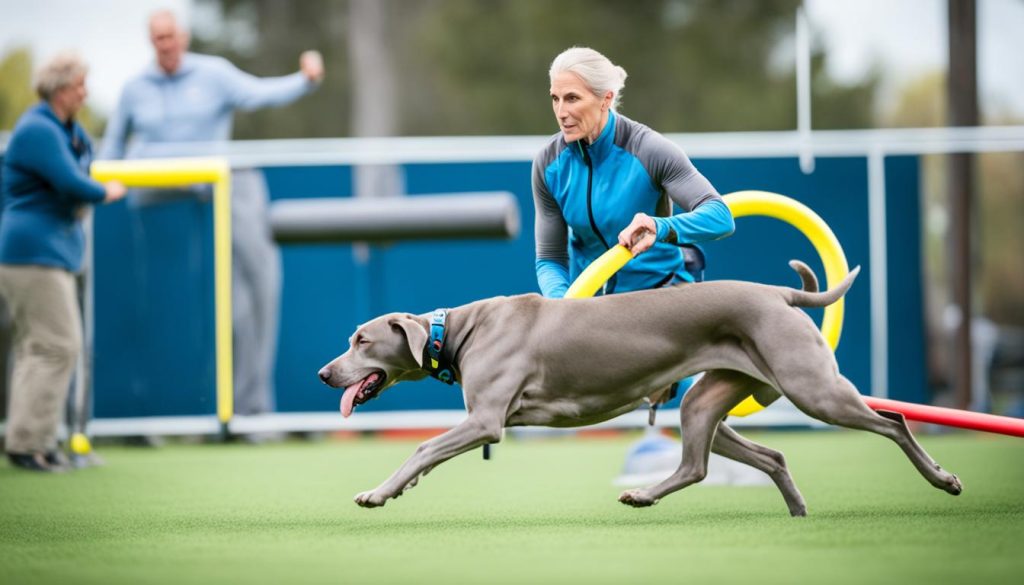When it comes to intelligent canine companions, Weimaraners are often at the top of the list. These stunning dogs, with their sleek silver coats and regal stature, possess not only beauty but also impressive intelligence. But just how smart are Weimaraners, and what makes them such clever pets? Let’s delve into the world of Weimaraners and uncover their top smart characteristics.
Are Weimaraners Smart
- Weimaraners are known for their intelligence and quick learning abilities.
- They were originally bred in 19th-century Germany to be courageous and competent hunting dogs.
- Weimaraners have a rich history and gained popularity in the United States after World War II.
- While intelligent, Weimaraners can also be assertive and restless, requiring structured training and socialization.
- Proper exercise and mental stimulation are essential to keeping Weimaraners happy and well-behaved.
Weimaraner Temperament & Personality
While Weimaraners were bred to be intelligent, friendly, and attentive companions, they can also exhibit challenging traits that potential owners should be aware of. Weimaraners have a unique temperament and personality that requires careful understanding and management.
First and foremost, Weimaraners can be assertive and stubborn. They have a strong will and may display independent behavior, which can make training challenging. Additionally, Weimaraners are restless by nature and have high energy levels that need to be properly channeled. If not provided with adequate mental and physical stimulation, they may resort to destructive behaviors.
One notable characteristic of Weimaraners is their strong prey drive. They may chase small animals, such as cats, and exhibit possessiveness over food or toys. These behaviors can be managed with early socialization and consistent obedience training.
Due to their temperament and behavior, Weimaraners are not suitable for first-time dog owners or owners without a large home and backyard. They require serious structure, guidance, and plenty of exercise to thrive.
However, with proper training, socialization, and a dedicated owner, Weimaraners can be wonderful companions. They can form strong bonds with their families and are known to be loyal and protective. Weimaraners can also excel as watchdogs, alerting their owners to any potential threats. Additionally, they are natural adventure buddies and love to participate in outdoor activities like hiking and running.
Understanding and appreciating the unique temperament and personality of a Weimaraner is key to successfully owning and raising one. With the right approach, these intelligent dogs can bring joy, love, and adventure into the lives of their owners.
Training a Weimaraner
Weimaraners are highly intelligent and independent dogs, which means that they require focused training to ensure a well-behaved and obedient pet. While they have the potential to learn quickly, they can also be stubborn, making training a challenge at times. It is essential for Weimaraner owners to establish themselves as the pack leader and use positive reinforcement techniques.
Patient and consistent training methods are key when working with a Weimaraner. Harsh or aggressive training methods can be detrimental to their sensitive nature and may result in timid behavior. Instead, opt for affirmative and gentle discipline to motivate and guide them towards desired behaviors.
Early socialization is crucial for Weimaraners to prevent them from becoming timid or fearful of new experiences. Puppy classes and controlled interactions with other dogs and people help them develop good manners and positive social skills.

Housebreaking and Crate Training
Housebreaking a Weimaraner can be a lengthy process requiring patience and consistency. Establish a routine for regular bathroom breaks, and use positive reinforcement training methods such as treats and verbal praise to encourage desired behavior.
Crate training is highly recommended for Weimaraners. It not only provides a safe space for them, but it also helps with housebreaking and prevents destructive behavior when left unsupervised. Gradually introduce the crate and associate it with positive experiences, such as treats or meals, to create a positive association.
Training Challenges for Weimaraners
Training a Weimaraner comes with unique challenges due to their intelligent and independent nature. Here are some common challenges you may encounter:
- Stubbornness: Weimaraners can be headstrong and may test their boundaries during training. Use firm and consistent commands to establish rules and reinforce your role as the pack leader.
- Distractibility: Weimaraners have a keen sense of smell and are easily distracted by scents or sounds. Choose training environments with minimal distractions and gradually increase difficulty as they become more focused.
- Prey Drive: Weimaraners have a strong instinctual prey drive, making it challenging to divert their attention from potential targets. Incorporate impulse control exercises into their training to manage this behavior.
With patience, consistency, and positive reinforcement, Weimaraners can develop into well-behaved and obedient companions.
| Training Tips for Weimaraners |
|---|
| Establish yourself as the pack leader |
| Use positive reinforcement techniques |
| Start socialization early |
| Enroll in puppy classes |
| Practice consistent housebreaking |
| Implement crate training |
| Be patient and consistent |
Weimaraner Exercise Requirements
Weimaraners are high-energy dogs that require an ample amount of exercise. Their activity level is quite high, and they have a lot of energy to burn. Regular exercise is crucial to keeping them happy and healthy.
Exercising a Weimaraner is essential to prevent them from becoming bored and engaging in destructive behaviors. These dogs are not suited for apartment living and require a sizeable home with a fenced-in yard to roam and play.
Exercise Needs
A Weimaraner needs at least one hour of exercise per day to stay physically and mentally stimulated. It’s important to provide them with a variety of activities to satisfy their energy and stamina.
Here is a list of exercise activities that are recommended for Weimaraners:
- Long walks
- Runs or jogs
- Hiking
- Playtime in a secure area
In addition to physical exercise, Weimaraners also require mental stimulation. Engaging them in games like fetch and training sessions will help keep their minds sharp and prevent boredom.
Weimaraner Stamina and Energy Levels
Weimaraners are known for their stamina and high energy levels. They have been bred to be active hunting dogs, which contributes to their need for exercise. These dogs can keep up with various outdoor activities and make great adventure companions.
Without regular exercise and mental stimulation, a Weimaraner may become restless, anxious, and exhibit destructive behaviors. Providing them with opportunities to release their energy will contribute to their overall well-being.
| Exercise Needs | Activity Level |
|---|---|
| Minimum one hour per day | High |
Weimaraner Life Span & Longevity
The average life span of a Weimaraner is 10 to 12 years, which is relatively long compared to other dogs of their size.
Weimaraners are generally healthy, but they can be prone to certain health conditions such as hip dysplasia. It is important to obtain health clearances from certified establishments when purchasing a Weimaraner puppy.

Feeding Requirements for a Weimaraner
Feeding your Weimaraner a balanced diet is crucial to support their active lifestyle. As an owner, it’s important to understand the specific feeding requirements of your Weimaraner to ensure they receive proper nutrition.
Weimaraners typically require 3-4 cups of dry food per day, which should be divided into two meals. This portion size can vary depending on factors such as the dog’s age, metabolism, and weight. It’s essential to consult with a veterinarian to determine the appropriate amount of food for your Weimaraner.
While Weimaraners are generally not gluttonous, they can be messy eaters. Having a designated feeding area and using bowls that minimize spills can help manage this. Additionally, providing fresh water at all times is essential to keep your Weimaraner hydrated.
Weimaraners should be fed a high-quality dog food that meets their specific nutritional needs. Look for dog food brands that are specifically formulated for active breeds or large dogs. These formulas typically provide the necessary nutrients to support your Weimaraner’s energy levels and overall health.
Incorporating a variety of protein sources, such as chicken, beef, or fish, can provide your Weimaraner with essential amino acids. Additionally, including carbohydrates, such as brown rice or sweet potatoes, can provide energy for their active lifestyle.
It’s important to keep an eye on your Weimaraner’s body condition and adjust their food portions accordingly. If your Weimaraner appears to be gaining weight or becoming overweight, reducing their portion sizes or switching to a weight management formula may be necessary.
Remember that every dog is unique, and individual differences can affect their dietary needs. Regularly monitoring your Weimaraner’s weight, consulting with a veterinarian, and making adjustments as needed will help ensure they maintain a healthy weight and receive optimal nutrition.
Weimaraners require a balanced diet consisting of appropriate portion sizes and high-quality dog food. Consult with a veterinarian to determine the specific feeding requirements for your Weimaraner and make adjustments as necessary to support their active and healthy lifestyle.
Grooming a Weimaraner
Weimaraners have short, smooth coats that are relatively easy to groom. Maintaining their coat’s appearance includes regular brushing with a bristle brush, typically done on a weekly basis. This not only helps keep their coat neat and glossy, but it also promotes good circulation and removes loose hair.
While Weimaraners are not heavy shedders, it is important to check them regularly for ticks and fleas, especially during outdoor activities. These pests can cause discomfort and transmit diseases, so it’s crucial to take preventive measures and seek appropriate treatments if necessary.
Just like humans, Weimaraners also need dental care. Brushing their teeth 2-3 times a week helps prevent plaque buildup, bad breath, and dental diseases. Regular tooth brushing can be initiated early on to establish a positive grooming routine and ensure oral hygiene.
Trimming your Weimaraner’s nails as needed is essential for their comfort and mobility. Overgrown nails can cause discomfort and may lead to joint problems or paw injuries. It is advisable to get your Weimaraner accustomed to nail trimming from a young age to make the process less stressful for both of you.
In addition to their coat, teeth, and nails, it is essential to check your Weimaraner’s ears for any signs of infection or inflammation. Regular cleaning and inspection can help prevent ear problems and maintain their overall well-being.
Grooming Tips for Weimaraners:
- Brush your Weimaraner’s coat weekly with a bristle brush to maintain its appearance and promote good circulation.
- Check your Weimaraner regularly for ticks and fleas, especially after outdoor activities.
- Brush your Weimaraner’s teeth 2-3 times a week to prevent dental problems.
- Trim your Weimaraner’s nails as needed to maintain their comfort and mobility.
- Inspect and clean your Weimaraner’s ears regularly to prevent ear infections.
Conclusion
After exploring the various aspects of Weimaraners, it is clear that they are intelligent, active, and loyal companions. However, they are not suitable for everyone and require careful consideration before bringing them into your home. With the right training, socialization, and structure, Weimaraners can become excellent family pets and adventure buddies.
Understanding the temperament of a Weimaraner is crucial, as they can be assertive, stubborn, and restless. It is essential to establish yourself as the alpha and provide consistent obedience training to ensure a well-behaved pet. Additionally, Weimaraners have high energy levels and require at least one hour of exercise per day, along with mental stimulation to keep them happy and fulfilled.
Grooming a Weimaraner is relatively easy, thanks to their short, smooth coat. Weekly brushing and regular checks for ticks and fleas are necessary. They are generally receptive to grooming if introduced early on. It is also important to monitor their diet and feed them a balanced meal that supports their active lifestyle.
Weimaraners are a wonderful breed for those who are willing to invest time and effort into their training, exercise, and grooming needs. They can bring joy, companionship, and adventure to your life. If you are considering adding a Weimaraner to your family, make sure to meet their requirements and provide the love and care they deserve.






